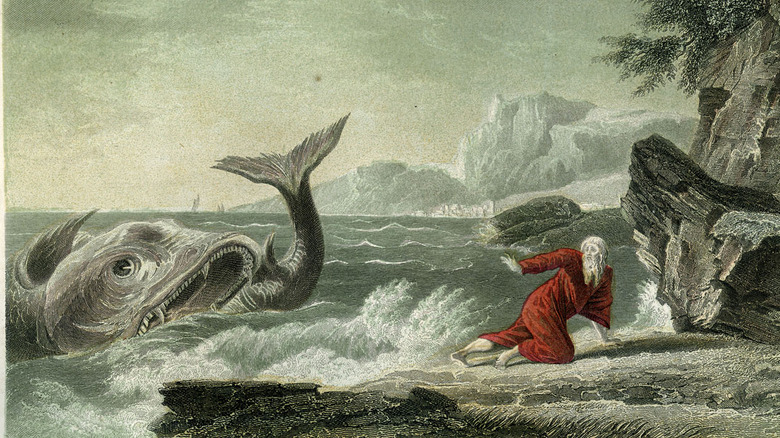According To The Bible, How Long Was Jonah Inside The Whale?
For centuries, Christians have been taught the Old Testament story of Jonah and the whale. For those not familiar, the story goes as follows: God sends the prophet Jonah to Nineveh to preach against the city's wickedness, as Bible Study Tools explains. Jonah doesn't want to go and tries to sail off in the opposite direction, only for a storm to pop up and imperil the ship. After the crew decides to toss Jonah overboard to appease God, per Jonah's own suggestion, the storm abates. But instead of drowning, the prophet is swallowed by what the Bible calls a "great fish," which is sometimes (inaccurately) referred to as a whale. After some time to think things over while in the belly of the beast, Jonah has a reluctant change of heart and finishes his mission.
As the story goes, Jonah felt that God engineered the storm out of vengeance after he disobeyed an order. The storm was God's way of calling Jonah out and reminding him of his duty. God saved him from drowning when the fish swallowed him, allowing him to stay alive inside of the creature and realize he had little choice in the matter.
According to the Bible, Jonah prayed while inside the fish, saying, "But I, with the voice of thanksgiving, will sacrifice to you what I have vowed. I will pay." With that, God told the fish to release Jonah, and the creature hurled him onto dry land.
The Bible says Jonah spent 3 days and 3 nights in the belly of the 'great fish'
The famous narrative touches on some key issues for Christians, including obedience and trusting God. But how long was Jonah in the whale?
The Biblical narrative is actually quite specific about it — at least, compared to other mentions of time periods in the Bible. Jonah 1:17 says that the prophet was in the belly of the beast for "three days and three nights," per Bible Gateway. That may seem like an oddly specific way of describing the time frame, but it was necessary to be this specific because of the method of timekeeping used in Jonah's day.
For centuries, most of the world, and the West specifically, has used the Roman method of measuring days — a new day begins at midnight and lasts until midnight the next day. As such, there's no need to specify a day and a night since the 24-hour period will include daylight and sunlight.
However, Palestinian Jews of the era (to include Jonah) reckoned a new day as beginning at sundown and then ending at sundown the next day, according to Beyond Today. Further, a part of a day was considered a "day" according to the timekeeping of the era. As such, it was necessary to specify that Jonah spends somewhere close to 72 hours — three 24-hour days — in the whale's belly. According to Steppes of Faith, that timeframe is a metaphor for Jesus spending the same period of time in his grave before being resurrected.
The story of Jonah has parallels to the story of Jesus
According to Steppes of Faith, Jesus would himself spend the same period of time (or a similar period of time, depending on your point of view) in his grave, which makes specificity important if Jonah's experience is going to serve as a metaphor for that of Jesus.
Catholic Exchange says the New Testament included a nod to Jonah's three-day plight in Matthew 12:40 when Jesus prophesized, "Just as Jonah was in the belly of the whale three days and three nights, so will the Son of Man be in the heart of the earth three days and three nights."
In another similarity, the story of Jesus is that he rose from his grave three days after being buried and accepted as dead. The same would have been thought for Jonah, who was thrown into the sea during a storm and left for dead, only to miraculously return to pass along God's message to the people. Specifically, to Gentiles instead of the Jews of Israel — something Jesus is also said to have done after his resurrection.
The concept of time in the Bible often doesn't jive with today's accepted ways of measuring the hours, days, and years. Yet the three days and nights Jonah is said to have spent inside the giant fish is viewed by some Biblical scholars as a precursor to what would happen in the life, supposed death, and subsequent resurrection of Jesus Christ in the New Testament.


